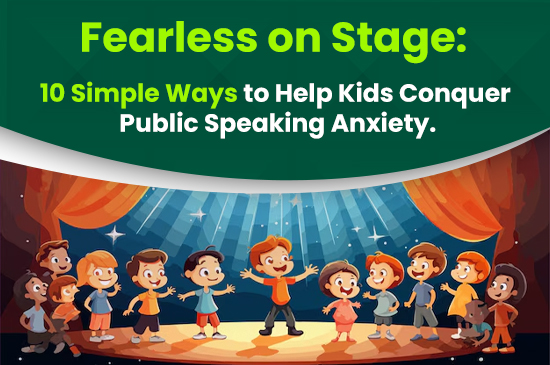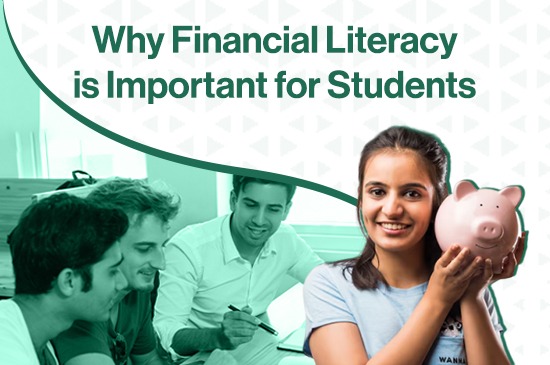Introduction
Does your child freeze when it’s time to speak in front of a crowd? Do they avoid presentations, mumble their words, or simply shy away from public speaking opportunities?
Public speaking is an essential life skill that not only boosts a child’s self-confidence but also lays the foundation for leadership abilities. It’s an integral part of modern life, whether delivering a school presentation, participating in debates, or addressing an audience. However, conquering the stage and captivating listeners is no easy feat for many children.
Stage fright—commonly known as “stage fear“—can replace confidence with sweaty palms, often accompanied by nervous symptoms like shaky hands, weak knees, a racing heart, and a constricted throat. It’s a daunting challenge for kids, especially under the spotlight. While some brush it off and shine, others find themselves paralyzed by anxiety, unable to express their thoughts or showcase their talent.
Research shows that 77% of people fear public speaking, making it one of the most common anxieties worldwide. For children, stage fear can become a significant roadblock, holding them back from expressing themselves, developing self-esteem, or taking on leadership roles. Left unchecked, this fear can hinder their growth and lead to a life of shyness and missed opportunities.
But fear not! Stage fright doesn’t have to define your child’s journey. With the right tools and guidance, your little one can transform their anxiety into confidence and reclaim the stage with poise and power.
As a parent, encouraging them to “be confident” might feel like a broken record by now—but don’t worry! This blog will guide you in identifying the signs of anxiety and provide strategies to help your child overcome these challenges with ease.
Understanding Public Speaking Anxiety in Kids

What Is Public Speaking Anxiety?
Public speaking anxiety or the fear of Public speaking, also known as glossophobia. It is one of the most dreaded activities in childhood for teenagers. It occurs as anxiety or fear of speaking in public, which is followed by postural symptoms such as:
- Dry mouth
- Sweaty palms
- Shaking hands
- Shortness of breath
Why do kids fear public speaking?
Several factors contribute to this fear:
- Fear of Judgment: Teens & kids worry about being judged or criticized by their peers and adults.
- Lack of Preparation: Unfamiliarity with the material can increase kids’ speech anxiety.
- Fear of Forgetting Words: The pressure to perform perfectly can be overwhelming for a teen and the kid might face school presentation anxiety.
Signs of public speaking anxiety in teenagers include avoidance of speaking situations, physical symptoms like sweating or shaking, and verbal expressions of fear about upcoming presentations.
10 Easy Tips to Conquer Stage Fright

- Start Small: Encourage your child to practice in low-pressure environments—like speaking in front of family or even a mirror. This creates familiarity and helps them gain confidence gradually and reduces anxiety over time.
- Boost Confidence Through Preparation: Help them rehearse their speech multiple times. Familiarity with the material reduces the fear of the unknown and gives them a sense of control.
- Use Visualization Techniques: Ask your child to close their eyes and imagine delivering their speech confidently while the audience applauds. Visualization can help transform anxiety into excitement.
- Practice Deep Breathing: Teach them simple deep-breathing exercises to mentally calm their nerves and center their focus before stepping on stage.
- Encourage Positive Self-Talk: Help kids speak confidently by replacing negative thinking with positive thinking, i.e., “I can do it,” which could encourage them to be more independent and confident.
- Incorporate Fun Public Speaking Games: Engage your teens in games of storytelling or speaking with unknown or less-known topics with an emphasis on a fun learning experience, thereby reducing anxiety before speaking of the learning process. Learning becomes exciting when it feels like play!
- Focus on Body Language: Teach your child to stand tall, make eye contact, and use hand gestures confidently. Positive body language enhances their stage presence.
- Encourage Regular Practice: Enroll them in drama clubs, debate teams, or public speaking courses. Structured practice builds skills and reduces anxiety.
- Provide Constructive Feedback: Acknowledge their effort and progress while gently guiding them on areas for improvement. Positive reinforcement boosts confidence
- Celebrate Successes: Acknowledge and commend them for such successes, no matter how small, and construct positive associations with public speaking.
Bonus Tips: It is said that a fearless and confident mind is driven by a healthy body, so you can also check our physical fitness-related blog for teenagers which will keep them physically fit so that they can be mentally fit and confident as well :
https://blog.investeen.live/why-teens-need-a-regular-exercise-routine-for-better-health/
Benefits of Overcoming Public Speaking Anxiety

Helping your child conquer stage fright opens up a world of benefits:
- Ability to resist anxiety: The ability to resist anxiety and build confidence successfully speaking in public for child development.
- Better Communication Skills: Regular practice enhances verbal articulation and reduces anxiety before speaking along with clarity.
- Critical Thinking: Encourages quick thinking and problem-solving during speeches.
- Persuasive Abilities: Develops skills to influence and captivate audiences effectively.
- Enhanced Academic Social Performance: Confident speakers often perform better in school and social settings. Therefore, conquering stage fright for kids is very important.
- Career Advantages: Opens doors to opportunities requiring strong presentation skills.
- Opportunities for Leadership Roles: Good public speaking competence is also a route to leadership positions for confident speaking skills pave the way for leadership opportunities.
Resources to Support Kids in Public Speaking
To further assist children in developing public speaking skills:
- Local or online public speaking courses for nervous speaker teenagers can be worth enlisting them in and guiding them on how to calm a child before a speech.
- Recommend books or videos focused on public speaking techniques that will conquer stage fright for teens.
- Explore apps designed to aid speech preparation and public speaking exercises for today’s teenagers.
Conclusion
Public speaking anxiety is not a lifelong sentence. With patience, practice, and the right guidance, your child can transform into a confident and fearless speaker. Public speaking is more than just delivering words—it’s about discovering your voice and owning the moment. For kids & teenagers, conquering stage fear unlocks a world of possibilities, from boosted confidence to becoming future-ready leaders. Imagine your child standing tall in the spotlight, speaking with passion, and leaving an impact on their audience. That transformation is closer than you think. With these simple tips and consistent support, your child can turn their fear into fuel and the stage into their playground.
The journey to fearless speaking starts today—let them shine brighter than ever!
FAQs (Frequently Asked Questions)
How can parents help kids prepare for public speaking?
Parents may foster practice, give helpful feedback, facilitate the organization of thought, and establish conditions for meaningful dialogue under low-pressure settings. But a public speaking course can help them better in this case.
How much role does practice play in the overcoming of public speaking fear?
Consistent practice familiarizes kids with what they are supposed to know, minimizes fear of the unknown, and overall enhances confidence in them.
Is there a method to assist children in getting used to using their quiet time to think calmly before speaking?
Yes, deep breathing exercises, positive affirmations, visualization of success, and light physical activity can ease nerves before speaking.
How can teachers create a conducive climate for public speaking?
Teachers can instill peer support, emphasize effort over outcome achievement, create situations for all students to voice themselves, and give constructive feedback.
What are some fun ways to introduce kids to public speaking?
Public speaking can be turned into a pleasant and less dreadful activity through activities such as storytelling, role-playing, debate games, and carrying out short skits.
How important is audience feedback for young speakers?
Constructive feedback can be beneficial to children during their learning process and positive reinforcement provides encouragement and motivation to repeat their efforts.
How can kids handle their mistakes during a presentation?
Teach children to be calm, pause for a moment, and move on quietly, without drawing too much attention to the mistake. Mistakes are natural and part of learning.
How can technology help kids overcome public speaking anxiety?
Apps and technology for speech practice, virtual reality simulations of audiences, and the recording of speeches for self-analysis can be utilized to train children to become better public speaking and anxiety management.









